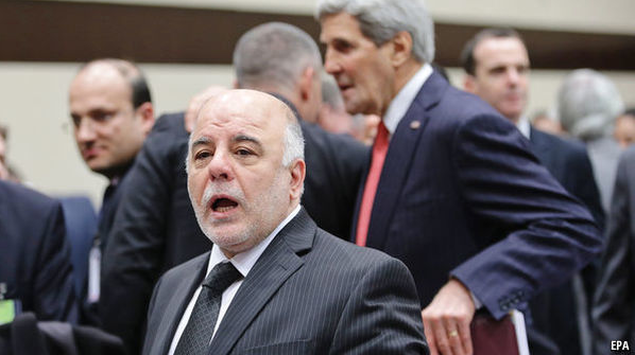He had held no previous military post, and in his youth had dodged the draft. As a British exile, he fixed lifts for the BBC. But while Iraqis seemed content to leave the battle against IS to others, particularly the Iranian-backed Shia militias, they looked to him to right Iraq’s woefully corrupt state, which is divvied up between sectarian and Kurdish political blocs.
Fifteen months into the job, he has made many of the right noises. In contrast to his megalomaniac predecessor, Nuri al-Maliki, he goes walkabout, brushing aside his few guards so that people can take selfies with him. He handed the plane Iran gave Mr Maliki to the state airline. “We’ve started blowing some big fish out of the water,” he promised. And his political reform plans, unveiled in September, initially went down very well.
Throughout the summer, hundreds of thousands of protesters had taken to Iraq’s streets, demanding that he dismiss a cabinet selected by the political blocs who treat ministries like cash machines, handing contracts to their chums and pocketing salaries for legions of ghost workers. “The parties haven’t come to build the state,” says Baghdad’s governor, whose religious Shia party, Sadr, looked to garner public support by backing the protests. “They’ve come to build themselves and their bank accounts.”
But Mr Abadi has squandered his opportunity with half-steps and tokenism. He took to Facebook to announce the opening to traffic of the Green Zone, the chunk of central Baghdad the Americans turned into a government enclave in 2003 and which has bunged up the capital ever since. But he only opened a single one-way road, disrupted by so many checkpoints that the old routes are still faster.
He cut his cabinet from 33 to 22, but all bar four of the old-timers got new government titles. He gave three vice-presidents, Mr Maliki included, 48 hours to leave their official residences in the Green Zone; but did nothing when they stayed. On October 18th his prosecutor said that the trade minister would stand trial for corruption. But Mr Abadi has kept him on. Rather than cut the bloated public sector, he has added half a million to the payroll in the name of the war effort. His advisers despair.
Of course, change is not easy. The youth and sports minister, from another Shia religious faction, ISCI, decries the cumulative $900 billion of government money spent since the Americans gave the factions ministries in 2003, including $75 billion on an electricity system that is still plagued by blackouts. But he bridles at the suggestion that he might start by culling his 8,000 employees, too many of whom, when they show up, slouch at empty desks.
And Mr Abadi’s hand is weak. As a member of the Islamic Dawa Party, he owes his job to the party system, but remains a bit-part player in it. The former prime minister, Mr Maliki, remains Dawa’s head, and his loyalists are now threatening to withdraw their support for Mr Abadi if he does not do their bidding. “If he’d have touched the party system, we’d probably have shot him,” says a middle-ranking Dawa hand. Many resent the system which has seen the factions turn Baghdad’s prime property into compounds and distribute the oil wealth to militias. But livelihoods depend on it, and many more fear what would happen should it crash. When Mr Abadi halved the monthly expenses MPs get for their security teams, parliament overruled him.
Unable to sack non-existent workers, Mr Abadi instead is seeking to cut salaries. Senior civil servants and policemen have seen their wages and expenses sharply pruned. Many lower-tier staff are months in arrears. Struggling to pay his rent, an official in the prime minister’s office complained that he has had to move back with his parents.
The circle of malcontents is growing. “There’s a strong Baghdad undercurrent trying to bring him down,” says Mowaffak al-Rubaie, a former national security adviser still close to Mr Abadi. Dawa is considering replacing its own man, perhaps with Mr Maliki, or Ali al-Adib (another Dawa stalwart) or Hadi al-Amiri (a militia chief who is leading the current attack on IS). Fearful that such strongmen would bolster Iran, Western powers have been eyeing their own candidates, too. Some look to old survivors who are at arm’s length from the religious blocs, including the current head of the finance committee, Ahmed Chalabi. Elections are due in 2017, but many now doubt Mr Abadi’s future will be settled at the ballot box.
View the article here


 RSS Feed
RSS Feed